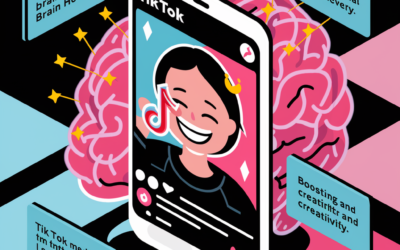So, whether you're struggling with persistent negative thoughts, feeling stuck in a rut, or simply want to amplify the happiness in your life, this video is for you. Let's go!
Technique #1: Practice Gratitude
The first technique is one of the most well-researched and effective ways to boost happiness: practicing gratitude. Numerous studies have shown that taking time each day to reflect on the things you're grateful for can have a profound impact on your overall well-being.
When you focus your attention on the positive aspects of your life, rather than dwelling on the negative, it triggers a cascade of neurochemical changes in your brain. This includes increased production of dopamine and serotonin - the "feel-good" neurotransmitters that are crucial for regulating mood and promoting feelings of contentment.
Consider starting a daily gratitude practice, even if it's just jotting down 3-5 things you're thankful for in a journal each morning. Over time, this habit can rewire your brain to naturally gravitate towards the good, helping you cultivate a more optimistic, appreciative outlook on life.
Technique #2: Engage in Acts of Kindness
The next technique is all about shifting your focus outward and engaging in acts of kindness. When you do something nice for someone else, whether it's volunteering your time, paying for a stranger's coffee, or simply offering a compliment, it activates the reward centers in your brain. This, in turn, releases a surge of feel-good chemicals like oxytocin and endorphins, which can boost your mood and overall sense of well-being.
The positive effects of kindness aren't just limited to the recipient - the person performing the act of kindness also experiences a significant mood boost. So, by making kindness a regular part of your life, you can essentially "hack" your brain to become happier.
Technique #3: Practice Mindfulness
The third technique is all about being present in the moment - a practice known as mindfulness. When you're fully engaged with the here and now, rather than ruminating on the past or worrying about the future, it can have a profound impact on your happiness levels.
Mindfulness has been shown to reduce stress, improve focus and concentration, and even increase gray matter in the parts of the brain associated with emotional regulation and well-being. By taking just a few minutes each day to tune into your senses, observe your thoughts and feelings without judgment, and anchor yourself in the present moment, you can rewire your brain to experience more joy and contentment.
Technique #4: Engage in Regular Exercise
The next technique is all about getting your body moving. Regular exercise has been proven to be one of the most effective ways to boost mood and increase happiness levels. When you engage in physical activity, your brain releases a flood of endorphins, which are natural mood-boosting chemicals that can help alleviate symptoms of depression and anxiety.
The benefits of exercise go beyond just the immediate mood boost. Over time, a consistent exercise routine can actually change the structure and function of your brain, leading to improved cognitive function, better stress management, and a more positive outlook on life. So, whether it's a daily walk, a yoga session, or a high-intensity workout, make sure to incorporate regular physical activity into your routine.
Technique #5: Cultivate Meaningful Connections
The fifth technique is all about cultivating meaningful connections with others. Humans are inherently social creatures, and our relationships with family, friends, and community play a crucial role in our overall happiness and well-being.
Research has shown that strong social ties are associated with a lower risk of depression, increased life satisfaction, and even a longer lifespan. By investing time and energy into building and nurturing your relationships, you can rewire your brain to experience more joy, fulfillment, and a greater sense of belonging.
Technique #6: Embrace Challenges and Setbacks
The sixth technique may seem counterintuitive, but it's all about embracing challenges and setbacks as opportunities for growth and self-improvement. While it's natural to want to avoid discomfort and struggle, research has shown that facing and overcoming obstacles can actually be a key driver of happiness and well-being.
When you confront and work through challenges, your brain releases dopamine and norepinephrine, which can boost your mood and increase your sense of accomplishment. Additionally, the process of problem-solving and persevering in the face of adversity can help you develop greater resilience, self-confidence, and a more positive, growth-oriented mindset.
Technique #7: Prioritize Self-Care
The final technique is all about prioritizing self-care. In our fast-paced, high-stress world, it's easy to neglect our own needs and well-being in pursuit of external goals and obligations. However, taking the time to nurture and care for ourselves is essential for cultivating lasting happiness and fulfillment.
Whether it's setting aside time for a relaxing hobby, practicing mindfulness or meditation, or simply taking a break to recharge, engaging in regular self-care activities can have a profound impact on your brain and overall well-being. By making self-care a priority, you can rewire your brain to experience more joy, contentment, and a greater sense of inner peace.
Well, there you have it - 7 proven techniques to help you rewire your brain for happiness. Remember, the key is to start small and be consistent. Incorporate even one or two of these strategies into your daily routine, and over time, you'll begin to notice a significant shift in your mindset and overall well-being.
So, what are you waiting for? Start reprogramming your mind for happiness today! And don't forget to subscribe to "Reprogramming Mind" for more tips, tools, and strategies to change your mind for good.
What are Valuable Skills to Build Now and For the Future?
The...
The Impact of TikTok on Mental Health: A Comprehensive Analysis
TikTok has...
The Double-Edged Sword: Is Social Media Good or Bad for Mental Health?
Social...
The Impact of TikTok on Brain Health: What You Need to Know
[et_pb_secti...
Benefits of Journaling
Journaling...
How to Get Over the Death of a Service Dog like a Vietnam Veteran in 78 minutes.
This is an...
PTSD Symptoms in Women: Understanding the Unique Challenges
Post-traumat...
How to Cure PTSD Four Times in 5 Hours
This case...
How Can Couples Maintain Intimacy While Sleeping Apart?
Sleep...
The Ultimate Guide to Walking with a Weighted Vest for Maximum Fitness Benefits
Walking...























